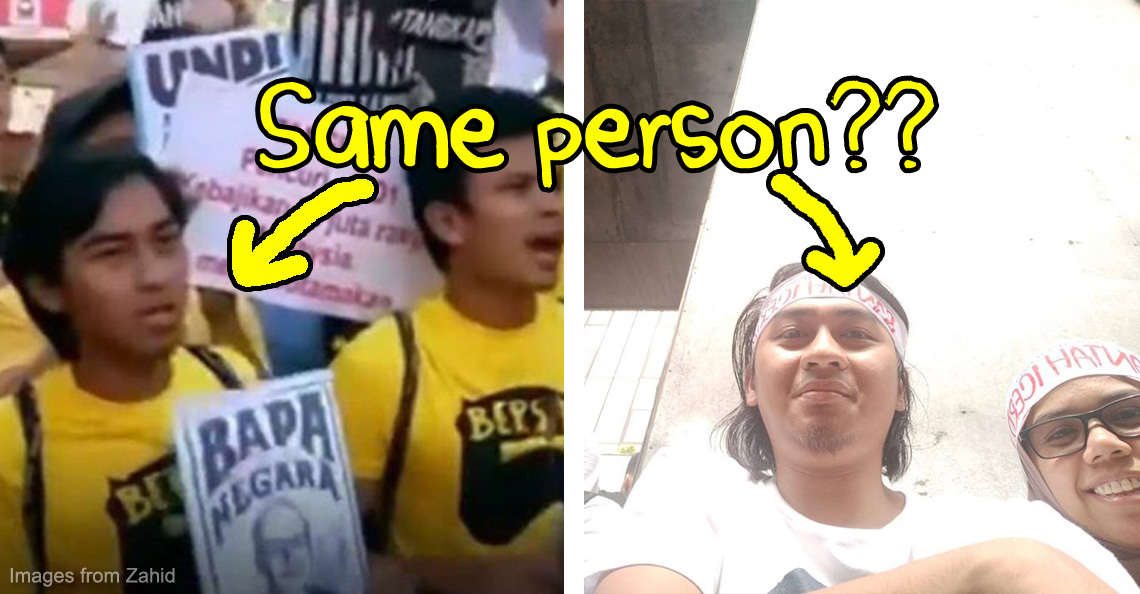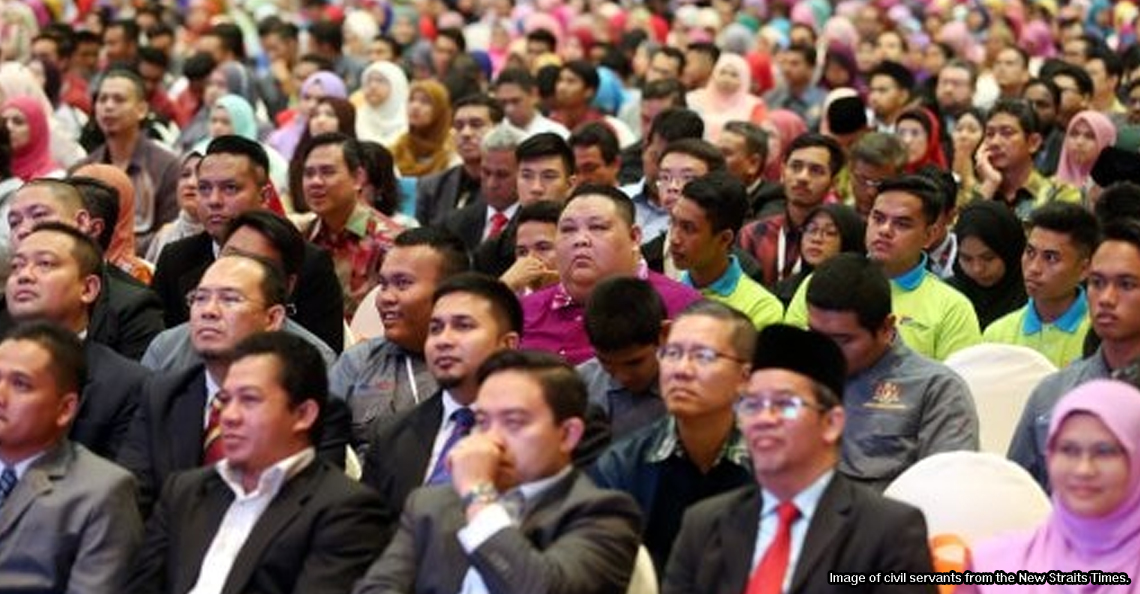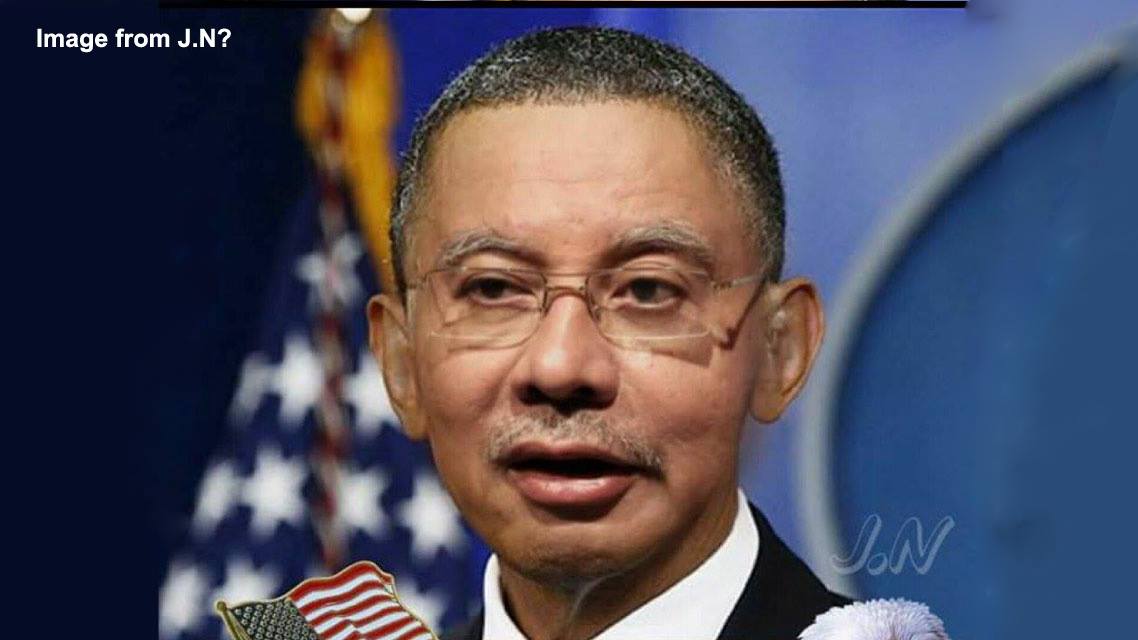ICERD – what do overseas Bumiputras think of Bumi rights? We ask them.

- 1.6KShares
- Facebook1.5K
- Twitter10
- LinkedIn20
- Email22
- WhatsApp54
So in case you haven’t heard, on Wednesday there was yet another protest near the Parliament. Wah, so free ar Malaysians? Anyway, it was pretty lit, with about 100 people chanting stuff and carrying a coffin… which supposedly symbolized the “death” of Malay Muslims in the country.

See, it all started when the Waytha Moorthy, a Minister in the Prime Minister’s Department, announced that the new government will ratify (sign and make official) several international treaties within the next few months, and one of them is the UN’s International Convention on the Elimination of All Forms of Racial Discrimination, or ICERD for short.
Supposedly, by ratifying the convention, Malaysia will strive to rid itself of policies concerning race. Some had taken this as a threat to Article 153 of the Federal Constitution, which sets forth the special position of Malays and natives of Sabah and Sarawak, aka the Bumiputeras. People got pissed, with change.org petitions being drawn up, indigenous and religious parties speaking up against it, and debates on whether or not it can be done springing up like mold on bread.
So we thought we’d go for something a little different. We teamed up with SOSCILI (our Malay counterpart) and thought that hey, wouldn’t it be interesting to know what Bumiputeras outside Malaysia think about Bumi rights?

Oh yes we did. We spoke to eight Malaysian Bumiputeras living in different parts of the world to know their thoughts on Malay/Bumi rights, and they are:
- Tanner, in Singapore for 7 years.
- Grace (Joyce), in the US (California) for 1 year. Studied in the US for 4 years prior, and had lived in Singapore for several years.
- Ruby, recently moved to the UK for about a month.
- Debbie Amboi-Payne, in the US (California) for the past six months.
- Harith Kamal, in Ireland (Dublin) for the past 5 years.
- Aisya, in Brunei for the past 6 years.
- Eiman Asyraf, in Egypt for the past 4 years.
- Liyana Zayid, in Japan.
The first thing we noticed was that…
They are quite divided on whether or not Bumi rights should continue
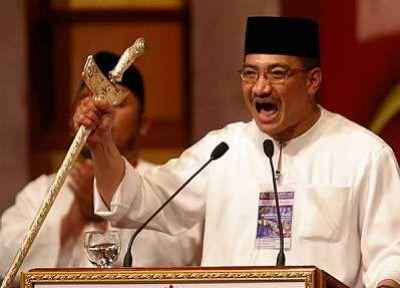
[Note: Soscili respondents mostly gave their answers in Malay, but for the sake of continuity and readability we’ve translated them to the closest English equivalent.]
Of the eight people we spoke to, three of them are in favor of Bumi rights. Aisya said that it should be preserved and continued, while Eiman believe that Bumiputera rights are still relevant, but it probably gets a bad reputation because of misinterpretation. Eiman looked back at the social contract situation (which you can read about here) and said that the concept of Malay special rights, or Ketuanan Melayu, is simply something Malays get in exchange for giving other races citizenship back during the Merdeka Days.
“…It’s more towards acknowledging the status of Malays as ‘indigenous’ and the master that once built and ruled the civilization in this country. The special rights of Malays were created as something to exchange with the citizenship given to other races that came later, so they have to acknowledge Malays as the ‘master’ of the land.” – Eiman, to Soscili.
Harith also mentioned the social contract as his reason for defending Bumi rights, but others feel that the rights are now no longer about the social contract. Grace, for one, felt that our founding fathers had good intentions when they came up with the social contract and tried their best to protect the Malays and the native tribes of Sabah and Sarawak, but today the system had been abused by privileged Malays/Bumiputeras.

Tanner, Debbie, and Ruby all cited that the original purpose of Bumiputera rights was to help the then underprivileged Malays to gain an equal footing with other races in terms of economy, but like Grace they all mentioned that in recent times, the rights have been misused by a select few to gain economical advantage, and sometimes, in politics as well.
“Article 153 was set up to (what we believed then) help an economically-marginalized group gain an equal footing. As what we can see now, the racial definition of said group is obsolete (‘not all poor people are Malay/Bumis, not all Malay/Bumis are poor’).” – Debbie, to Cilisos.
To counter the problem, they suggested that the Bumiputera rights be redesigned into a system to help the underprivileged according to income brackets, not race.
“…the concept of the rights should not be race specific, it should be redesigned to be equal across all races but capped by income brackets for instance, this then allows those in the lower income bracket to grow themselves and provide themselves an opportunity to make a life for themselves. We should be done with ethnic categorizations years ago.” – Tanner, to Cilisos.
But still, removing such a big part of what makes Malaysia “Malaysia” might have some consequences, so the next question we asked them was…
What would happen if every race in Malaysia get equal rights?
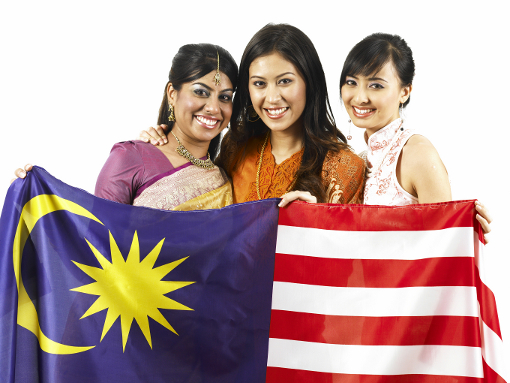
Since they have different opinions on whether Bumi rights should be continued or not, it makes sense that our respondents have different ideas about a Malaysia without Bumi rights. While some feel that it will be a good thing, even for Bumis…
“I think it can create a better Malaysia where everyone is given equal opportunities. The Bumiputera can then become more competitive and they now can prove that they are experts in their own fields without the assistance of these rights and privileges.” – Ruby, to Cilisos.
“This sounds like a wonderful idea. I would appreciate it if I was valued for my contribution to society, rather than my ethnicity.” – Debbie, to Cilisos.
…others were a bit more doubtful. Aisyah, for one, feels that removing Bumi rights will cause Malaysia to be a secular country (not connected with religious matters), and Malays in turn would be oppressed. Eiman, on the other hand, felt that the Malays will fall even further behind. His reasoning was that even with Section 153 in place, Malays fail to close the economic gap with the other races, so without it the gap will just grow bigger.
“What is some 40+ years of the NEP (New Economic Policy) compared to the hundreds of years advantage given to other races by the British colonials. So to me, as long as the Malays still cannot close the economic gap or manage to be as economically strong as other races, Section 153 and the NEP will stay relevant and needs to be protected.” – Eiman, to Soscili.
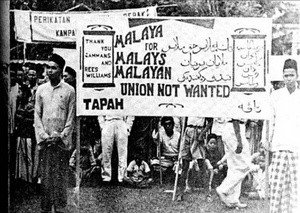
As for Harith, he had stated that he wouldn’t mind if equal rights are given to other races, as long as they make the effort to assimilate. He stressed that there are still many Malaysians who can’t even speak Malay or sing the national anthem right, and that some of them have the wrong idea about the Bumiputera status being unattainable if you’re born to another race.
“The reality is, if they had wanted to assimilate from before, their children might have been considered as Bumiputeras now. Marry the Malays. Even if you hate Malays and Muslims, there are still good-looking Kadazans and Bidayuhs. Try to unite instead of demanding the same rights but doing nothing.” – Harith, to Soscili.
Huh. That’s an… interesting take on things. Anyway, the next question we asked them was…
How does Malaysia compare with their current country of residence?
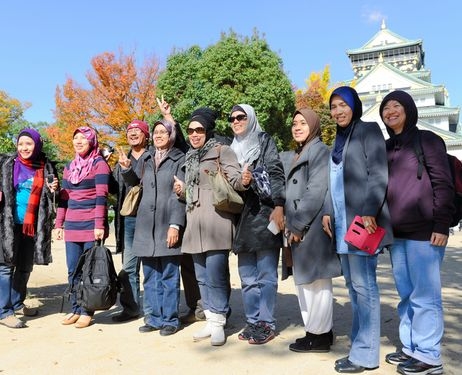
We’ve got two respondents from California, USA, and while Grace prefers not to talk about it, Debbie feels that you can’t exactly say that race relations in Malaysia is better or worse than the US, as they’re totally different beasts. According to Debbie, Americans relate to each other depending on how they view its history, while relations between Malaysians feel a bit more insulated.
“It’s almost always about 4 different groups: Malay, Chinese, Indian, and ‘dan lain-lain’ (which, btw, is a moronic way to group people). We have lived with generations-old racial stereotypes (that were never true) since we have gained independence as a nation, and the people taking advantage of this (British or Malaysian) has inadvertently shaped the country based on this race-based agenda.” – Debbie, to Cilisos.
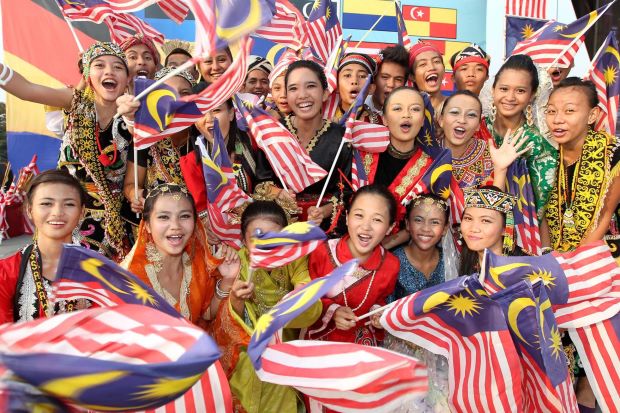
Liyana, from Japan, felt that this is a hard comparison to make, as race is so homogeneous in Japan that it was never an issue. It can also be said to be the same in Egypt, which according to Eiman, are dominated by the Arabs. He’s not sure whether there are racial policies in place there, but based on his observations, in Egypt the Egyptians (Arabs) go first.
“Even the Egyptians put their race first in many things, like in medical services, office matters and others. As far as I can see, it’s their race first as the indigenous citizens” – Eiman, to Soscili.
Harith, who have lived in Dublin, Ireland for the past five years, said that that Dublin doesn’t have any specific rights for the original settlers, but he noted that there are no economical gaps between the races, and that non-indigenous races have no problem assimilating. However, like Debbie, he felt that it’s inappropriate to compare Malaysia to Dublin, due to different histories.
“They don’t have the same history as us, where other races are brought in en masse by colonialists to work, and we are later forced to accept them as a condition for independence. So to compare our country with colonial countries is not appropriate, seeing how different our demographics are.” – Harith, to Soscili.

Ruby told us that she had not experienced discrimination in the UK, and that it is Muslim-friendly there. But Brunei seemed to be a different story altogether. According to Aisya, the special rights of Malays there are heavily guarded by the Sultan, and it’s very hard for the Chinese to get citizenship, even if their children are born there. And it would seem that you can’t talk about equality at all.
“You can never raise the issue of race equality here, if you don’t want to face the legal consequences. Even heavy crimes can’t be talked about, as you can get arrested for that. You exchange information (gossip about the country’s internal affairs) in secret. When the hudud laws were gazetted many from other races (especially the Chinese) were unhappy with that, but they stayed silent for fear of punishment from the higher ups.” – Aisya, to Soscili.
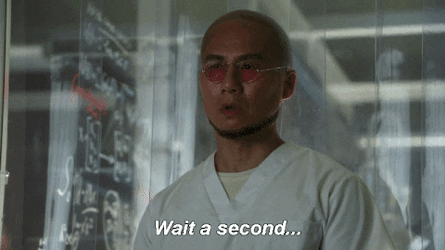
Closer to home, it would seem that Singapore does not have race policies, according to Tanner. While he admits that there will be inequality no matter which country you live in (certain races will do better, some families have a better chance), Tanner said that Singapore is designed to give everyone a fighting chance.
“…the infrastructure is solid, there are government bodies for almost every area of interest that aim to assist and guide and to some degree ensure success. To simplify, meritocracy is a deeply held value in the Singaporean culture. It survives on the idea that talent and hard work will be rewarded.” – Tanner, to Cilisos.
Getting back to Malaysia, it would seem that getting rid of racial policies is quite a polarized issue, so…
Based on the responses we get, we have a deep set issue to resolve.
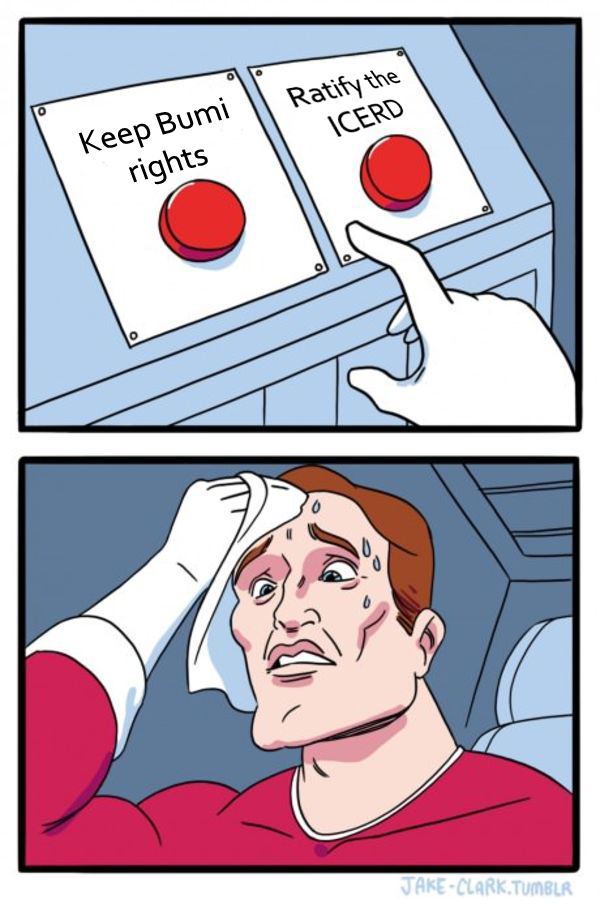
Following the uproar, Waytha had clarified that while the road to ratifying the ICERD may have several bumps on it, the Government believed that the international convention could be signed with exemptions. Dr Mujahid Yusof Rawa, another minister in the Prime Minister’s department, also said the same thing.
“Malaysia can ratify with reservations, which means that we can ratify the convention while still adhering to existing laws and provisions under the Federal Constitution… This means that if we sign the treaty, it will not change what is currently practiced unless such laws are tabled and passed in Parliament,” – Datuk Seri Dr Mujahid Yusof Rawa, as reported by the Star.
Others, like Andrew Khoo, the co-chair of the Bar Council constitutional law committee, felt that the ICERD and Article 153 are compatible, even without said reservations as Article 153, at its essence, aims to bring about a kind of equality that’s not just formal or superficial. So by the way things are going, there’s a chance that the Government may still ratify the ICERD, but the Bumi rights won’t be affected. What do y’all think about this?
A lot of things had happened since the Bumi rights were given to the Malays and the indigenous peoples of Sabah and Sarawak, and through the NEP, the 13 May incident and a lot of other events it had evolved and became what it is today. Can it still evolve, or will it be replaced? We’ll let the government decide on that. As Liyana told us, there are still other barriers to be overcome in the way to equality for all races, but addressing the issue of Bumi rights is a start.
“I know taking away special rights from the Malays or giving special rights to everyone else won’t suddenly make Malaysia the fairest country on the planet. There’ll still be economic/social structures that will wall out some people. But at least those barriers can be overcome, maybe not in 1 or even 3 generations, but still, there’s hope.” – Liyana, to Soscili.
- 1.6KShares
- Facebook1.5K
- Twitter10
- LinkedIn20
- Email22
- WhatsApp54

